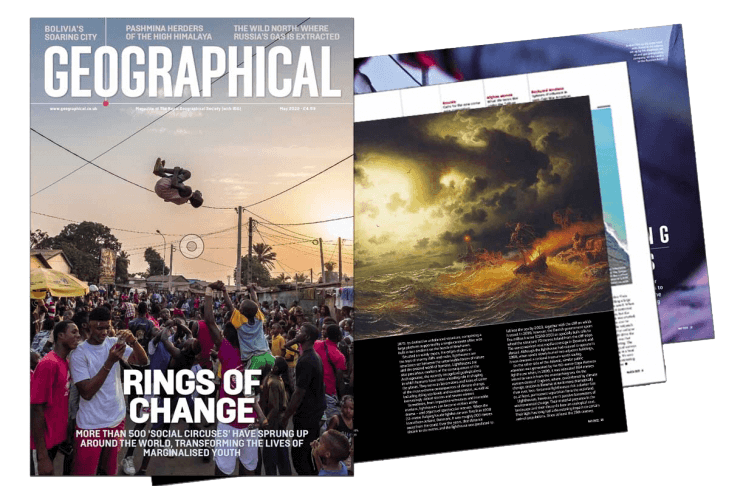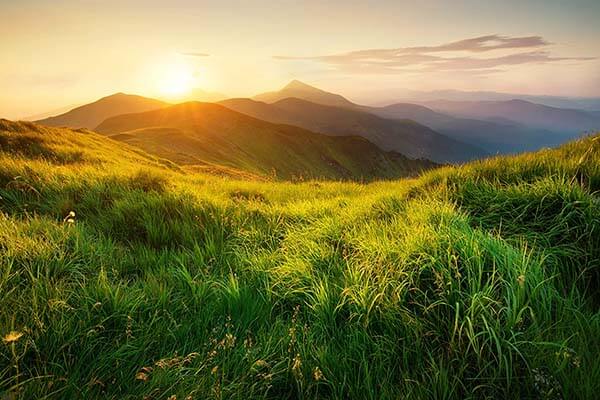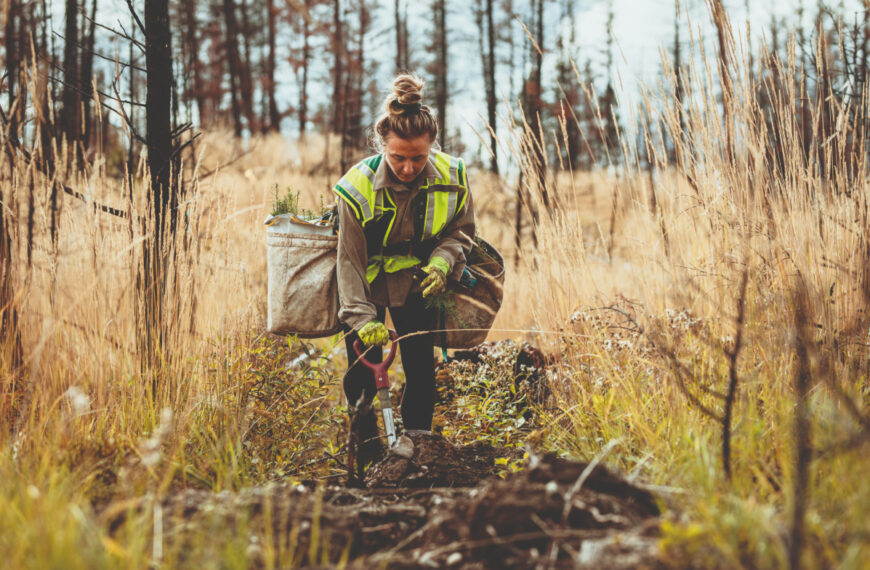
Physical Geography is all about the processes that shape the Earth. Here’s our pick of the best university degree courses available
Physical geographers explore the spatial variations and temporal changes that occur across the Earth’s surface. Generally, the field of physical geography is concerned with the atmosphere, hydrosphere, biosphere and geosphere – the processes and patterns that govern the natural environment. The built, human environment is the domain of human geography.
What specialisms can I choose with Physical Geography?
If you’re keen to focus on physical geography there are two main options. You can either pick a physical geography degree, or do a more general geography BSc degree. Geography BSc courses will cover both physical and human geography but usually have a stronger focus on the physical side (as opposed to Geography BA degree, which is more likely to prioritise human geography). Both options are included below.
With physical geography, you can study a wide range of sub-disciplines related to the natural environment. Sub-disciplines vary widely: geomorphology, hydrology, glaciology, climatology, meteorology, soil geography, oceanography, biogeography and environmental geography, are some options. While the sociological, cultural and economic relations of humans to the Earth are explored more closely in human geography, the anthropological impact of humans on natural systems are increasingly explored on the physical side of geography as well.
How is Physical Geography studied?
Physical geography is studied using a range of surveying, modelling and analytical techniques. Remote sensing and Geographic Information Systems (GIS) are increasingly used as analytical and modelling tools in all physical geography sub-disciplines. The rise of supercomputing, big data and artificial intelligence is extending the frontiers of physical geography, allowing researchers to study Earth systems with greater accuracy, detail and power than ever before.
The courses below are listed in order of entry requirements, highest to lowest:
Durham University Geography BSc (3 years)
The facts:
- 97 per cent of students were satisfied with the quality of the Geography BSc course at Durham University (National Students Survey)
- Average earnings of £28,000 at 15 months after completing the course (Graduate Outcomes Survey)
- 80 per cent of students go on to work and or study within 15 months after the course
- 95 per cent of graduates find their current work meaningful (Graduate Outcomes Survey)
The breakdown:
In Year One you’ll be introduced to the range of Durham’s research specialisms and research methods, including residential fieldwork overseas (for example Portugal). You’ll get the best of human and physical geography in the first year, before a broader range of optional modules allow you to specialise in your second and third years.
Your second year further develops your research and practical skills while allowing you to specialise in subjects of your choice. These range from ‘Climate Change’ to ‘Contested Environments’, to ‘Glaciers and Glaciation’ and ‘Mountain Landscapes’ – any sub-discipline in physical geography is there for you to explore.
In your third year, you’ll undertake a research project (dissertation) supervised by Durham academics. You’ll also choose from a selection of modules that involve material at the cutting-edge of contemporary research.
The place:
Durham sits among some of the finest architecture in the UK. Durham Castle and Cathedral are designated UNESCO World Heritage Sites. The city has a friendly and quaint feeling, but is only 10 minutes by train from the excitement of Newcastle.
Entry:
A Level: AAA/A*AB
Open days: For more information on open days see here.
Check out Durham University’s partner page
University of St Andrews Geography BSc (4 years)
The facts:
- 94 per cent of students were satisfied with the Geography BSc course at University of St Andrews (National Student Survey)
- Average earnings of £22,000 at 15 months after the course (Graduate Outcomes Survey)
- 85 per cent are in highly skilled work 15 months after the course (Graduate Outcomes Survey)
The breakdown:
In the first two years, you will develop an integrated vision of the world exploring the complex interrelationships between people and the planet. You will gain a conceptual and applied grounding in all of physical, environmental and human geography. You will also take required modules in at least one other subject, which will allow you to take Geography as a joint honours degree along with another chosen subject, such as biology or sustainable development.
In your third and fourth years, you will have the option to specialise in a range of different areas of physical geography, including climate and weather systems, glaciers and glaciation, natural resource management, and coastal processes. Final year students must complete a dissertation on a topic chosen in consultation with academic staff.
Throughout the course there are opportunities to undertake fieldwork both locally and overseas. Recent locations have included Norway, Iceland and Ireland.
The place:
The town of St Andrews has lots to offer. University buildings are located throughout the town; walking around you encounter ancient and modern buildings, parks and beaches, providing a rich and historic backdrop for student life. The unspoilt beaches provide fresh, clean air – the perfect antidote for the classrooms or laboratories.
Entry:
A Level: AAA–ABB
Open days: For more information about visits and virtual open days click here.
The University of Edinburgh BSc (Hons) Geography (4 years)
The facts:
- Ranked 22nd in the world and 7th in the UK for Geography (QS World University Rankings by Subject Rankings, 2024)
- 95 per cent of students in work or doing further study after completing BSc (Hons) Geography at The University of Edinburgh (Graduate Outcomes Survey)
- Edinburgh is ranked the 6th best student city in Europe and 13th in the world (QS Best Student Cities, 2025)
- BSc (Hons) Geography is accredited by the Royal Geographical Society with the Institute of British Geographers
The breakdown:
Using natural science, you will learn about the Earth’s surface processes and their complex interactions. You will also study some human geography – as it is important to understand the ways we live in the world, as well as our impact on it. You will study the changes happening to our planet caused by both natural processes and people’s actions around the world. This degree is also flexible. You will be able to build your degree around topics you are interested in.
In Year 1 you will gain a broad foundation across geographical topics including environmental issues, climate change, Earth surface processes, global economic and societal problems.
Year 2 helps you focus on physical geography topics including global change, environmental geography and geomorphology. You can also choose human geography courses. You will also gain research skills in physical geography and take part in field trips.
In Year 3, you will focus on specialised aspects of physical geography that interest you the most. There will be courses in geographical research skills and research design. You can also choose from a range of option courses in physical or human geography. You will have opportunities to specialise in either or both disciplines.
Year 4’s main focus will be on your dissertation. This is an independent, original piece of geographical research in your chosen specialist field. You will receive individual supervision from an academic with experience in your chosen subject area. You will also take extra geography courses. These include options in physical or human geography that can involve fieldwork.
The place:
The University of Edinburgh is at the heart of the city of Edinburgh. Scotland’s inspiring capital will be the backdrop to your studies and is regularly voted as one of the most desirable places to live in the world. The University of Edinburgh is also home to one of the largest and most successful groupings of geographers and geoscientists in the UK.
Entry:
SQA Highers: ABBB
A Level: AAA – ABB
IB: 34
Open days: To find more information about upcoming Open Days at The University of Edinburgh, click here.
Other geography degree options
University of Southampton Geography BSc (3 years)
The facts:
- 93 per cent of students were satisfied with the quality of the Geography BSc course at Southampton University (National Students Survey)
- £24,000 average earnings 15 months after the course (Graduate Outcomes Survey)
- 92 per cent of students go on to work and or study within 15 months after the course (Graduate Outcomes Survey)
The place:
Highfield Campus, where Physical Geography at Southampton is based, is the oldest and largest of the university’s seven campuses. It has beautiful gardens, historic buildings and modern study spaces.
The breakdown:
Year one provides a broad academic foundation in physical and human geography. Statistical and computing skills are an important element in the early stages. A module called ‘Dangerous Worlds’ will explore all aspects of climate change, including risks, exposure, vulnerability, resilience and sustainability. You’ll also attend an in-depth field course within the UK, and begin to choose your path into physical geography with optional modules.
In year two, core modules will immerse you in the field of physical geography. You’ll learn about remote sensing for earth observation and global water resources. Optional modules are diverse: you can study anything from Geographical Information Systems to Coastal Landscapes, to Energy in the Environment and much more.
In your third year, you’ll undertake a research project on a subject of your choosing. Optional modules give you the choice of specialising or diversifying your geographic interests. You’ll also have the option to travel and study in Switzerland or Cambodia.
Entry:
A Level: AAB
IB: 34
Open days: Information on open days is available here.
Newcastle University Physical Geography BSc (3 years)
The facts:
- 78 per cent of students were satisfied with the quality of the Physical Geography course at Newcastle University (National Student Survey)
- £27,000 average earnings after 15 months of completing the course (Graduate Outcomes Survey)
- 90 per cent of graduates after 15 months find their current work meaningful (Graduate Outcomes Survey)
- Top 100 in the Geography Category (QS World University Rankings by Subject 2020)
- 10th in the UK for research quality (Research Excellence Framework 2014)
The breakdown:
In your first year, you’ll explore global environmental issues alongside physical geography concepts and techniques. Compulsory module topics include glacial processes, volcanic and tectonic activity, flooding and fluvial processes, biogeography, geohazards and coastal processes.
In Year Two you’ll study advanced research techniques in physical geography. These will help you to deepen your understanding of key concepts and processes in physical geography research. You’ll choose between Ireland, Iceland, Morocco and New Zealand for your second-year field course. The remaining topics will be optional, giving you the opportunity to engage with cutting-edge research areas of your choice.
In your third year you’ll have a choice of optional modules and will complete a major piece of independent research in your dissertation, which represents a third of your studies. Specialist optional modules are linked to the research interests of high profile academics, providing cutting-edge research insights in physical geography.
Entry:
A Level: ABB
IB: 32
Open days: More information on open days available here
Cardiff University Physical Geography BSc or MSci (3 or 4 years), Marine Geography BSc or MSci (3 or 4 years), Environmental Geography BSc or MSci (3 or 4 years)
The facts:
- Top 100 in the world (QS World University Rankings 2024)
- 100 per cent of fieldwork is accessible
- 95 per cent of graduates in employment, further study etc. 15 months after graduating (HESA)
- 88 per cent of students happy with teaching on their course (National Student Survey 2024)
- 55 (out of 1,963) for commitment to the United Nations’ Sustainable Development Goals (SDGs) (THE Impact Rankings 2024)
The breakdown:
Whether your interest is physical geography, environmental geography or marine geography, you’ll find the route for you at Cardiff.
The only one of its kind in the UK, Cardiff’s marine geography degree focuses on physical, hydrographical and managerial issues, not just of the oceans but also and importantly our coastlines. In the environmental geography degree you’ll look at the Earth’s surface and the science behind human impact over time. If studying physical geography you would learn how all the different processes work at Earth’s surface, how glaciers, rivers, landslides, desertification, and coastal processes change landscapes over time, and how to manage natural hazards.
These courses all have a lot in common in their first year, allowing you to switch going into your second year if you want to. You’ll also have options in geoscience and environmental sustainability science you might want to explore.
Field trips will take you out of the lecture theatre and into the field in every year of year degree, so that you develop hands-on practical skills. Fieldwork is funded and accessible, and for the majority of students it’s the highlight of their degree experience.
There’s also the option to do a four year degree – to include a professional placement year, a year abroad, or MSci, offering opportunities to develop crucial transferable skills and broaden your horizons. Cardiff University will support you to make the right choice for you and find the right experiences.
The place:
In Cardiff you’ll have mountains, coasts and rivers right on your doorstep. With Brecon Beacons National Park just an hour north of the city centre, and miles of golden
coastline to the west, Cardiff is the perfect place to study geography. It’s one of the most affordable cities in the UK to be a student and, with over 330 parks and gardens, it boasts more green space per person than any other UK core city.
Entry:
A Level: ABB-BBB (with 1 science subject) or BBB-BBC (with 2 science subjects)
IB: 32-31 overall or 665 in 3 HL subjects (with 1 HL science subject), or 31-30 overall or 665-655 in 3 HL subjects (with 2 HL science subjects)
Open days: More information on open days available here
University of Chester Geography BSc (3 years)
The facts:
- #1 in North-West England and #9 in the UK for student satisfaction (Complete University Guide)
- Over 92% of graduates go on to work and or study (Graduate Outcomes Survey)
- Accredited by the Royal Geographical Society
The breakdown:
Year one compulsory modules in ‘Earth and Environments’, ‘People and Places’, ‘Sustainable Development’ and ‘Global Hazards & Risk’ ensure a solid foundation in the discipline. Developing your fieldwork and research skills is an integral component of the first year, which includes residential fieldwork opportunities in Snowdonia / Eryri National Park.
In second and third year you may further develop your knowledge and understanding of a wide range of physical geography sub-disciplines, including: climate change; palaeoclimatology; glacial, fluvial, coastal and arid geomorphology; geobiology; Quaternary science; human impacts; remote sensing and GIS. Alternatively, you may choose to continue to study the full range of geography and opt to also undertake some human geography modules covering themes such as: geopolitics; the natural resource race; space, place and identity (e.g. gender, sexuality, disability, age, race and ethnicity). Overseas fieldwork in cold (Norway) and arid (South-East Spain) environments, and the production of a final year dissertation thesis are invaluable opportunities to further enhance your independent research skills.
Wide-ranging and advanced employment-focussed skills are embedded throughout the programme and we provide an invaluable opportunity for you to build relevant employment and problem-solving experience by working in an external organisation as a part of a full-time placement.
The place:
The ancient and picturesque city of Chester is a popular visitor attraction. It is steeped in history, with city walls and the largest Roman Amphitheatre, and where graduation takes place in the centuries-old cathedral.
Entry:
A Level: BBC
Open days: For more information on open days click here.
Keele University Geography BSc (3 years)
The facts:
- Ranked among the top three universities in England for student satisfaction (National Student Survey)
- Geography BSc is a Royal Geographical Society (with IBG) accredited programme
- 85 per cent of students go on to work and or study within 15 months after the course (Graduate Outcomes Survey)
- Average earnings of £20,000 15 months after completing the course (Graduate Outcomes Survey)
The breakdown:
The Keele course allows you to focus specifically on your preferred area of physical geography, or to explore geography as an integrated discipline concerned with people and their environment. The course focuses on climate change, global responsibility, sustainability, and the application of professional geographical skills to real-world situations.
Compulsory modules in year one prepare you for the fundamentals of conducting geographical research. You’ll study fieldwork and research skills, the fundamentals of physical geography, climate change, and the role of geographers in society.
In year two, you can begin to hone your degree focus to a physical geography subject of your choosing. Year three will bring the dissertation on a subject of your choice. Further optional modules include subjects ranging from coastal environments, rural geographies, water resources, glaciers and glacial geomorphology, and many more.
The course also comes with the option for an international year, to study abroad, and to learn a language alongside physical geography.
The place:
The campus at Keele University brings everything to your doorstep. Student accommodation, teaching buildings, restaurants and cafes, sports centres and bars are all to be found on the vibrant campus. At 600+ acres, Keele is Britain’s biggest single-site campus university.
Entry:
A Level: BBC
Open days: For more information on open days click here.
Bangor University Physical Geography and Oceanography BSc (3 years)
The facts:
- 87 per cent of students were satisfied with the quality of the Physical Geography and Oceanography course at Bangor University (National Students Survey)
- 90 per cent of students go on to work and or study after the course
- 45 per cent go on to work in a ‘highly skilled’ area (Graduate Outcomes Survey)
The place:
You’ll be hard-pressed to find a better location for a university campus. Nestled between the mountains and the sea, Bangor is surrounded by beautiful natural scenery. Nearby to Snowdonia National Park and surfing hotspots, options for outdoor activities are aplenty.
The breakdown:
In your first year you’ll study compulsory modules including ‘Environmental Data & Analysis’, ‘Earth Systems and Processes’, ‘Fundamentals of Oceanography’, and ‘Earth, Climate & Evolution’, with two optional field courses in Snowdonia and Anglesey. This is a course where budding oceanographers can gradually specialise in ocean systems.
Your second year entails a ship-based field course, along with core modules on ‘Ice and Oceans’. Optional modules allow you to specialise in a field of your choice, ranging from ‘Water, Air & Soil Pollution’, to ‘Climate Change’, through to ‘Tides, Waves & Marine Energy’.
In year three you’ll complete your dissertation, along with a core module on ‘Rivers, Coasts & Oceans’. More optional modules allow you to craft your own final year study. From ‘Marine Pollution’ to ‘Applied Geophysics’ the options are broad.
Entry:
A level: CC in two science subjects
Subscribe to our monthly print magazine!
Subscribe to Geographical today for just £38 a year. Our monthly print magazine is packed full of cutting-edge stories and stunning photography, perfect for anyone fascinated by the world, its landscapes, people and cultures. From climate change and the environment, to scientific developments and global health, we cover a huge range of topics that span the globe. Plus, every issue includes book recommendations, infographics, maps and more!












